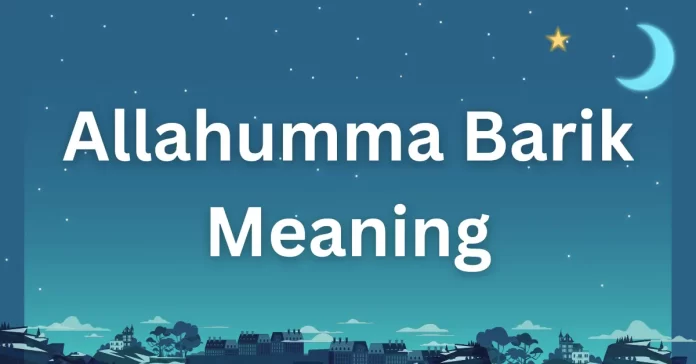Introduction
In the vast realm of Islamic supplications and phrases, “Allahumma Barik” holds a significant place. This beautiful phrase, which translates to “O Allah, bless” in English, is more than just a string of words; it encapsulates a deep spiritual meaning and carries profound significance in the lives of Muslims worldwide. This blog aims to delve into the meaning, usage, and importance of “Allahumma Barik,” exploring its roots, benefits, and ways to incorporate it into daily life.
The Meaning of “Allahumma Barik”
Linguistic Breakdown
Arabic:
اللَّهُمَّ بَارِكْ
Transliteration:
Allahumma barik
Translation:
“O Allah, bless”
“Allahumma Barik” is composed of two parts:
- Allahumma: This is a unique Arabic construct calling upon Allah. It’s an invocation meaning “O Allah” and is used to start a prayer or supplication.
- Barik: Derived from the root word “baraka,” which means blessing, prosperity, or an increase in goodness. When saying “barik,” it is a request for blessings.
Contextual Meaning
When combined, “Allahumma Barik” translates to “O Allah, bless.” This phrase is often used to ask for Allah’s blessings upon someone or something, invoking divine favor and prosperity.
Historical and Scriptural Significance
Qur’anic References
While the exact phrase “Allahumma Barik” doesn’t appear in the Qur’an, the concept of seeking blessings from Allah is deeply rooted in Islamic scripture. The term “baraka” and its derivatives are mentioned in numerous verses, emphasizing the importance of divine blessings.
Hadith and Usage by the Prophet Muhammad (PBUH)
The phrase “Allahumma Barik” is prominently featured in the Hadith literature. The Prophet Muhammad (PBUH) used this supplication in various contexts, often to bless others. For example, when a companion would achieve something noteworthy or acquire a new asset, the Prophet (PBUH) would say, “Allahumma barik lahu” (O Allah, bless it for him).
Spiritual and Practical Benefits
Invoking Blessings
It is a powerful invocation for blessings. By saying this phrase, Muslims believe they are inviting Allah’s divine favor into their lives, which can lead to increased prosperity, protection, and spiritual growth.
Strengthening Community Bonds
Using it when congratulating or complimenting others fosters a sense of community and brotherhood. It’s a way to express genuine goodwill and wish for others’ success and happiness, strengthening social ties and mutual respect.
Incorporating it into Daily Life
Everyday Situations
Greeting and Congratulations
When someone shares good news or achieves a milestone, responding with “Allahumma Barik” is an excellent way to express joy and wish them continued success and blessings.
Business and Transactions
In business dealings, invoking “Allahumma Barik” can be a way to seek Allah’s blessings for a prosperous and ethical outcome. It is often used to bless a new venture or a significant investment.
Personal Milestones
For personal achievements like graduating, getting married, or the birth of a child, saying it is a way to seek divine blessings for a prosperous and fulfilling future.
Enhancing Prayers
Incorporating “Allahumma Barik” into daily prayers can enhance one’s spiritual connection with Allah. It is often used in du’as (supplications) to ask for blessings in various aspects of life, from health and wealth to knowledge and guidance.
The Impact of “Allahumma Barik” on Personal Growth
Fostering Gratitude and Humility
Regularly invoking “Allahumma Barik” helps cultivate an attitude of gratitude and humility. Recognizing that all blessings come from Allah fosters a sense of appreciation for the good in one’s life and a humble acknowledgment of Allah’s infinite generosity.
Encouraging Positive Actions
Believing in the power of divine blessings encourages positive actions and ethical behavior. Knowing that Allah’s blessings are contingent upon righteous deeds motivates individuals to act with integrity and kindness.
Stories and Testimonials
Personal Accounts
Many Muslims have shared personal stories of how invoking “Allahumma Barik” has positively impacted their lives. These testimonials often highlight instances of unexpected blessings, protection from harm, and profound personal transformations attributed to this powerful supplication.
Community Experiences
Communities that collectively embrace and promote the use of “Allahumma Barik” often experience a sense of unity and mutual support. By consistently wishing blessings upon each other, these communities foster an environment of compassion and solidarity.
Common Misconceptions
Misuse and Overuse
While “Allahumma Barik” is a powerful phrase, it’s essential to use it sincerely and appropriately. Misusing or overusing it without genuine intent can diminish its spiritual impact and significance.
Cultural Variations
Different cultures within the Muslim world may have unique ways of expressing blessings and congratulations. Understanding and respecting these variations ensures that “Allahumma Barik” is used in a way that is culturally sensitive and meaningful.
Conclusion
“Allahumma Barik” is more than just a phrase; it’s a heartfelt invocation for divine blessings that carries profound significance in Islam. By understanding its meaning, historical roots, and spiritual benefits, Muslims can incorporate this powerful supplication into their daily lives, enriching their spiritual journey and fostering a sense of community and gratitude. Whether used in personal prayers, congratulatory messages, or everyday interactions, “Allahumma Barik” serves as a constant reminder of Allah’s infinite mercy and the blessings He bestows upon us.
Call to Action
Incorporate “Allahumma Barik” into your daily vocabulary. Use it sincerely and thoughtfully to wish blessings upon others and to seek divine favor in your own life. Share the beauty and significance of this phrase with your family, friends, and community, spreading the message of gratitude and humility that it embodies. May Allah bless us all abundantly – Allahumma Barik lana wa lakum.
Frequently Asked Questions (FAQs)
What does “Allahumma Barik” mean?
“Allahumma Barik” translates to “O Allah, bless” in English. It is a supplication used by Muslims to ask for divine blessings and favor upon someone or something.
How is it used in daily life?
It can be used in various situations:
- When congratulating someone on an achievement or milestone.
- During business transactions or when starting a new venture.
- In personal prayers to seek blessings for oneself or others.
- When expressing gratitude for any good news or success.
Is “Allahumma Barik” mentioned in the Qur’an?
The exact phrase “Allahumma Barik” is not mentioned in the Qur’an. However, the concept of seeking blessings (baraka) from Allah is deeply rooted in the Qur’an, with numerous verses emphasizing the importance of divine blessings.
Did the Prophet Muhammad (PBUH) use it?
Yes, the Prophet Muhammad (PBUH) used this supplication in various contexts. He often said “Allahumma barik lahu” (O Allah, bless it for him) to invoke blessings for his companions when they achieved something noteworthy or acquired new assets.
What are the benefits of saying it?
Saying “Allahumma Barik” invites Allah’s blessings into one’s life, which can lead to increased prosperity, protection, and spiritual growth. It also fosters a sense of community and strengthens social bonds by expressing genuine goodwill and blessings for others.
Can it be used in business contexts?
Yes, “Allahumma Barik” can be used in business dealings to seek Allah’s blessings for a prosperous and ethical outcome. It is often used to bless a new venture or a significant investment.
How can I incorporate it into my prayers?
You can incorporate “Allahumma Barik” into your daily prayers by using it in your du’as (supplications) to ask for blessings in various aspects of life, such as health, wealth, knowledge, and guidance.
What impact does regularly saying it has on personal growth?
Regularly invoking “Allahumma Barik” helps cultivate an attitude of gratitude and humility, recognizing that all blessings come from Allah. It also encourages positive actions and ethical behavior, motivating individuals to act with integrity and kindness.
Are there any cultural variations in the use of it?
Yes, different cultures within the Muslim world may have unique ways of expressing blessings and congratulations. Understanding and respecting these variations ensures that “Allahumma Barik” is used in a way that is culturally sensitive and meaningful.
Can it be misused or overused?
While “Allahumma Barik” is a powerful phrase, it’s essential to use it sincerely and appropriately. Misusing or overusing it without genuine intent can diminish its spiritual impact and significance.
How can I teach others about the significance of it?
You can teach others about the significance of “Allahumma Barik” by sharing its meaning, historical roots, and spiritual benefits. Encourage family, friends, and community members to use it sincerely and thoughtfully, spreading the message of gratitude and humility that it embodies.
What should I do if someone says it to me?
If someone says “Allahumma Barik” to you, respond with gratitude and appreciation. You can thank them and, if appropriate, reciprocate the blessing by saying “Barakallahu feek” (May Allah bless you).
Is it specific to any particular occasion?
“Allahumma Barik” is not specific to any particular occasion and can be used in various contexts, such as congratulating someone, seeking blessings for new endeavors, or during personal prayers. It is a versatile supplication suitable for numerous situations.

